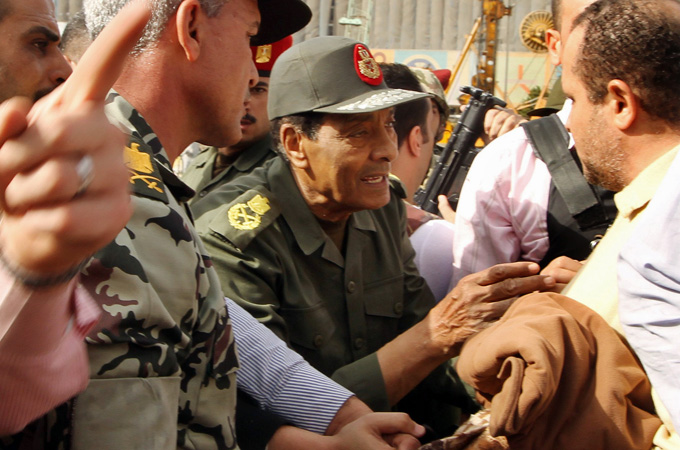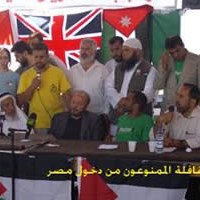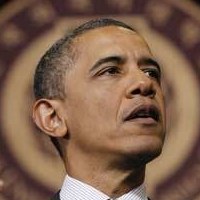![]()
Sat, Feb 12, 2011 | Youtube | Egypt State Information Service

General Mohamed Hussein Tantawy now acting as the de facto president of Egypt. This is a 'soft coup' by Egypt's Military.
Statement of the Supreme Council of the Armed Forces No. 5
The army council has released its 5th communiqué. Here are the new decisions of the army council (Sunday, Februari 13, 2011):
1. Freezing the current constitution. A key demand by the pro-democracy protesters.
2. Dissolving the parliament “both chambers”. Another key demand by the pro-democracy protesters.
3. The army will rule the country for a transitional period of 6 months (which means until mid August 2011) or until presidential and parliament elections can be held.
4. Forming a committee to amend some constitution articles.
5. Ahmed Shafik’s cabinet will continue in its job till having a new cabinet.
6. Mohamed Hussein Tantawy, the minister of defense who heads the council represents outside and inside the country, which means he is the de facto current president of Egypt.
7. Egypt respects its international treaties.
Source: EgyptianChronicles.
Full text of Communiqué No. 5 (Sunday, Feb 13, 2011):
The Supreme Council of the Armed Forces: Constitutional Proclamation
“The Supreme Council of the Armed Forces, aware of this critical moment in the history of the nation; fulfilling its historical and constitutional responsibility to protect the country and to preserve the safety and security of its territory, and aspiring to fulfill their duty to administer the affairs of the country, fully cognizant that the true challenge that faces our dear country Egypt is to release the creative powers of every member of our great people by providing freedom, and facilitating democratic processes through constitutional and legislative amendments, which the fulfill to the legitimate demands expressed by the people recently, and which go even further to wider horizons worthy of the stature of Egypt whose people built the first civilization in human history.
The Supreme Council of the Armed Forces believes that human freedom, the rule of law, support for the value of equality, pluralistic democracy, social justice, and the uprooting of corruption are the bases for the legitimacy of any system of governance that will lead the country in the upcoming period. The Supreme Council of the Armed Forces also equally believes that the dignity of the nation, is merely the reflection of the dignity of every one of its member, and that the free citizens, proud of their humanity, are the cornerstone of the a strong nation, and in light of the aforementioned and based upon it, and with a view to achieving a renaissance of our people the Supreme Council of the Armed Forces has decided the following:
First: the Constitution is suspended
Second: The Supreme Council of the Armed Forces shall temporarily administer the affairs of the country for a period of 6 months or until People’s Assembly, Shura Council and Presidential elections are held.
Third: The Chairman of the Supreme Council of the Armed Forces shall represent it internally and externally.
Fourth: The People’s Assembly and the Shura Council are dissolved.
Fifth: The Supreme Council of the Armed Forces shall issue laws during this transitional period.
Sixth: A committee to amend a number of articles of the constitution shall be established, and a popular referendum shall be held.
Seventh: The government of Dr. Ahmed Mohamed Shafik shall continue its work until a new government is formed.
Eighth: Elections for the People’s Assembly, the Shura Council and the Presidency shall be held.
Ninth: The State is committed to implementing all international treaties and covenants to which it is party.
God is the source of success and support.”
Field Marshal Hussein Tantawi
General Commander of the Armed Forces
Chairman of the Supreme Council of the Armed ForcesSource: Egypt State Information Service
Statement of the Supreme Council of the Armed Forces No. 4 (Arabic)
httpv://www.youtube.com/watch?v=SIhUqnHp4Tw
The Egyptian military said they were committed to a democratic process that would result in civilian rule. They also asked the Egyptian people to respect the much-reviled police forces that had brutally clashed with protesters in the early days of the uprising. The military said the country’s ministers will stay in power for the time being and international agreements and commitments will be honoured.
The main points:
1. The army is obliged to what was said in the previous communiqués. [See below for the previous army statements)
2. The government and the people to return back to their responsibilities toward the country. The Supreme Council asked the public, particularly the millions in the government sector, to “work to push the economy forward.”
3. The current government and governors will continue performing its duties till Egypt have a new elected government. The military called on the “current government and provincial governors to continue their activities until a new government is formed,”
4. The council is “looking forward to a peaceful transition, for a free democratic system, to permit an elected civil authority to be in charge of the country, to build a democratic free nation.”
5. Egypt respects its “commitment to all its international treaties,” reassurance that it continues to honor the 1979 Egypt-Israel peace treaty.
6. The army calls the people of Egypt to cooperate with the police.
Source: EgyptianChronicles.
Full text of Communiqué No. 4 (Saturday, Feb 12, 2011):
Statement of the Supreme Council of the Armed Forces (4)
“In the name of God the Most Gracious, the Most Merciful,
The fourth statement of the Supreme Council of the Armed Forces,
In light of the conditions that exist in the country, and the difficult times that have placed Egypt at a juncture that demands of us all to defend the stability of the nation, and the achievements of the people; And due to the fact that the current phase requires a reordering of the priorities of the state with the objective of meeting the legitimate demands of the people, and of delivering the nation from the current situation; And as the Supreme Council of the Armed Forces is aware that the rule of law is not only necessary for the freedom of the individual, but rather it is the only legitimate basis for authority; And with determination, clarity, and faith in all our national, regional and international responsibilities, and with recognition of God’s rights and in the name of God, and with His support, the Supreme Council of the Armed Forces announces the following:
First: The Supreme Council of the Armed Forces is committed to all matters included in its previous statements.
Second: The Supreme Council of the Armed Forces is confident in the ability of Egypt’s people and institutions to get through this critical situation, and to that end, all agencies of the state, and the private sector must play their noble and patriotic role to drive the economy forward, and the people must fulfill their responsibility towards that goal.
Third: The current government, and governors shall continue as a caretaker administration until a new government is formed.
Fourth: The Supreme Council of the Armed Forces aspires to guaranteeing a peaceful transition of authority within a free and democratic system that allows for the assumption of authority by a civilian and elected authority to govern the country and the build of a democratic and free state.
Fifth: The Arab Republic of Egypt is committed to all regional and international obligations and treaties.
Sixth: The Supreme Council of the Armed Forces calls on the great people to cooperate with their siblings and children in the civilian police forces, for affection and cooperation must exist between everyone, and it calls on the civilian police forces must be committed to their slogan “the police serve the people”.
God is the source of success.”
Source: Egypt State Information Service
Statement of the Supreme Council of the Armed Forces No. 3 (Arabic)
httpv://www.youtube.com/watch?v=LtrduQ0pNYc
Today, 11 February 2011 No. 3 statement was issued by the Supreme Council of the armed forces after the resignation of President Mubarak’s presidency.
The main points are:
1. The Supreme Council announced that they will act according the legitimate demands of the people.
2. The Supreme Council will remain in session to issue subsequent statements to the people.
3. The Supreme Council saluted the martyrs who sacrificed their lives.
4. The Committee also drew a tribute to former President Mohamed Hosni Mubarak for what he has done for Egypt in war and in peace.
Full text of Communiqué No. 3 (Friday, Feb 11, 2011):
“At this historical juncture in the history of Egypt , and in light of the decision by President Mohamed Hosni Mubarak to relinquish the office of the presidency of the Republic and the tasking of the Supreme Council of the Armed Forces with the administration of the affairs of the nation , and with awareness of the seriousness of the demands of our great people everywhere for fundamental change , the Supreme Council of the Armed Forces is examining this matter, asking the aid of God Almighty, to fulfill the aspirations of our great people. The Supreme Council of the Armed Forces will issue further statements that will announce forthcoming steps, measures and arrangements, and it affirms at the same time that it is not a replacement for the legitimacy that is acceptable to the people.
The Supreme Council of the Armed Forces extends its highest salutations and appreciation to President Mohamed Hosni Mubarak for his services over the course of his career in war and peace, and for the patriotic decision he took in choosing the supreme interests of the nation. In this respect, the Supreme Council of the Armed Forces extends its highest salutations and admiration to the souls of the martyrs who sacrificed their lives for the freedom and security of their country, and to every one of our great people. May God grant us success.
May God’s Peace, mercy and blessing be upon you.”
Source: Egypt State Information Service
Statement of the Supreme Council of the Armed Forces No. 2 (Arabic)
httpv://www.youtube.com/watch?v=84yUClLnxv8
Full text of Communiqué No. 2 (Friday, Feb 11, 2011):
Statement of the Supreme Council of the Armed Forces (2)
In light of the continuing developments that are determining the fate of the nation, and as part of its continual monitoring of internal and external developments, and the decision to delegate authorities to the Vice-President, and in light of the our commitment to our patriotic duty to preserve the stability and safety of the nation, the Council has decided to:
First:
Guarantee the implementation of the following measures:
• Lifting the state of emergency once the current situation ends;
• Adjudicating electoral challenges, and the resulting procedures;
• Introducing necessary legislative amendments, and the holding of free and fair presidential elections under the agreed constitutional amendments.Second:
Commit the Armed Forces to protecting the legitimate demands of the people, and to working to their achievement by monitoring the implementation of these procedures according to a specific timetable in order to ensure a peaceful transfer of authority and the achievement of the democratic and free society that the people demand.
Third:
The Armed Forces affirm that they will not pursue the honorable persons who rejected corruption, and demanded reform, and warn against any attempt to damage the safety of the nation and the people. They also affirm the need for work to continue at the agencies of the state, and for the restoration of normalcy in order to preserve the interests and properties of our great nation.
May God protect the nation and the people.”
Source: Egypt State Information Service
Statement of the Supreme Council of the Armed Forces No. 1 (Arabic)
httpv://www.youtube.com/watch?v=kqONe3oTtWE
Full text of Communiqué No. 1 (Thursday, Feb 10, 2011):
“Based on the responsibility of the Armed Forces, and its commitment to protect the people, and to oversee their interests and security, and with a view to the safety of the nation and the citizenry, and of the achievements and properties of the great people of Egypt, and in affirmation and support for the legitimate demands of the people, the Supreme Council of the Armed Forces convened today, 10 February 2011, to consider developments to date, and decided to remain in continuous session to consider what procedures and measures that may be taken to protect the nation, and the achievements and aspirations of the great people of Egypt.”
Source: Egypt State Information Service
Formation of the Armed Forces Supreme Council
The Armed Forces Supreme Council is formed of 18 members under the chairmanship of the president of the republic, who doubles as the Supreme Commander of the Armed Forces. It includes in its membership in the current form Lt. General Sami Annan, the Chief of Staff of the Armed Forces, Admiral Mohab Memish, the Commander of the Maritime Force, Air Marshal Reda Hafez, the Commander of the Air Force, Lt. General Abdel Aziz Seif, the Commander of the Air Defense Forces, General Hassan al-Rwini, the Commander of the Military Central Zone and Staff General Ismail Othman, the Director of the Morale Affairs Department, General Mohsen al-Fanagry, the Assistant Defense Minister, Staff General Mohammed Abdel Nabi, the Commander of the Border Guard, Staff General Mohammed Hegazy, the Commander of the Third Field Army and Staff General Sobhy Sedky, the Commander of the Second Field Army along with the commanders of the northern, southern and western zones.
Field Marshal Mohammed Hussein Tantawi
Field Marshal Mohammed Hussein Tantawy is the Commander in Chief of the Armed Forces. He was born in 1935 to an Egyptian Nubian father. He graduated from the Military Academy in 1956 and then from the Commanders and Staff Academy .
He was promoted to the rank of Field-Marshal in 1993. He obtained a Ph.D in military sciences from the Military Academy in 1956 and them from the Commanders and Staff Academy in 1971. He also obtained the war 7 course from the Higher Military Academy in 1982.
He participated in all Egyptian wars starting with 1956, passing through June war of 1967 and then the attrition war from 1967 to 1972. He was the commander of the 16 battalion in October War 1973. He also participated in the Kuwait liberation war in 1991 as the head of the Armed Forces Operation Room. He occupied several posts in the Egyptian Army including head of the organization branch, operations department, the field army and member of the teaching staff of the Military Academy . He was also the military attache in Pakistan and Afghanistan . He was also the commander of an infantry brigade.
He was the operations commander – infantry command – and led the operations branch in the Armed Forces Operations Board. He was the commander of the infantry legion, the republican guard, the staff chairmanship and the infantry force.
He was named minister of defense and military production on December 31, 2005 and Armed Forces Chief Commander.
He was awarded several military medals including the military bravery medal
Lt. General Sami Annan
Lt. General Sami Annan is the Armed Forces Chief of Staff
He was born in 1948 in Slamon al-Qomash village in Mansoura, Daqahliya Governorate.
He participated in the attrition war and then October War in 1973. He worked as commander of the missiles battalion in 1981. He was also commander of the Air Defense Force in 2001 until 2005.
He passed several specialized courses in the Air Defense. He participated in several courses in Russia and obtained the fellowship of the National Defense Academy from Nasser Military Academy and the fellowship of the Higher Military Academy from Nasser Academy .
He was named Chief of Staff in 2005 to fill in the place of Lt. General Hamdy Wheba, who was named as head of the Arab Organization for Industrialization.
Air Marshal Reda Mahmoud Hafez
Air Marshal Reda Mahmoud Hafez is holding the post of the Commander of the Air Force. He was born in 1952 and graduated from the Air Force Academy in 1972. He participated in October War in 1973. He obtained an M.A. in military sciences and the fellowship of the Higher Military Academy . He was awarded the military duty medal. He is holding the post of Commander of the Air Force since 2008.
Lt. General Abdel Aziz Seifeddin
Lt. General Abdel Aziz Seifeddin is the Commander of the Air Defense. He was born in 1949 and graduated from the Military Academy in 1970. He participated in the attrition war and October War. He occupied several posts including the head of operations of the Air Defense Forces in 2001.
Admiral Mohab Mohammed Hussein Memish
Admiral Mohab Mohamed Hussein Memish is the Maritime Force Commander since 2007.
Source: Egypt State Information Service



 RSS
RSS



















RT @CrethiPlethi: #Egypt Army Council Communiqué No. 5 | #democracy #Jan25 http://j.mp/dU0yB1
Update with full text: #Egypt Army Council Communiqué No. 5 | #Jan25 #democracy http://j.mp/dU0yB1
Updated: All 5 Egypt Army Council Communiques (full text, links and info on Council members) | #Jan25 #Egypt http://j.mp/dU0yB1
RT @CrethiPlethi: Update with full text: #Egypt Army Council Communiqué No. 5 | #Jan25 #democracy http://j.mp/dU0yB1
[…] Field Marshal Tantawi leads the interim government in Egypt. The Egyptian military confirmed this in Communique 5. The document dismisses the parliament and suspends the civil government and parliament (with the […]
[…] You can read the previous Army Council communiqués (No. 1 – No. 5) here. […]
[…] the Egyptian population, but, this past Sunday, the current Egyptian military government released Communiqué No. 5 pledging to abide by all of Egypt’s foreign treaties and commitments, which includes the Peace […]